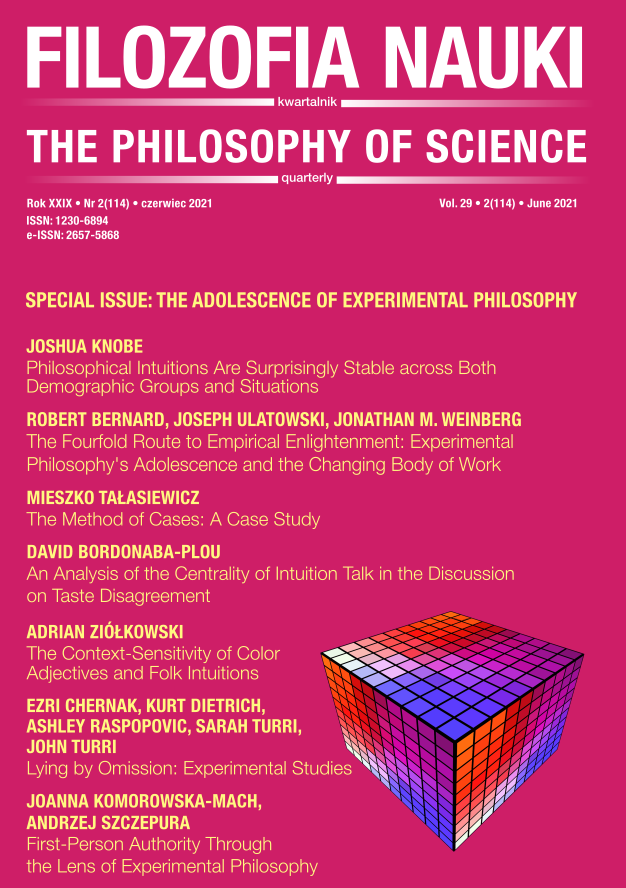First-Person Authority Through the Lens of Experimental Philosophy
DOI:
https://doi.org/10.14394/filnau.2021.0011Słowa kluczowe:
first-person authority, self-ascriptions, mental states ascription, privileged access, disagreementAbstrakt
In this paper, we analyze the problem of first-person authority and the possibility of disagreement over mental states between first- and third-person ascribers. We explain why discussion on this matter should be preceded by empirical study on the actual strength, scope, and restrictions to such authority. We present a new study in which we show that the type of the ascribed mental state and the kind of interpersonal relationship between speakers both influence the strength of first-person authority. We also suggest that analysis of a disagreement between a first- and a third-person ascriber of a mental state should take into account the intuition that it is possible that neither of these disagreeing speakers is wrong in their ascriptions.
Bibliografia
Boyle M. (2009), “Two Kinds of Self-Knowledge,” Philosophy and Phenomenological Research 78(1), 133-164. https://doi.org/10.1111/j.1933-1592.2008.00235.x
Burge T. (1988), “Individualism and Self-Knowledge,” The Journal of Philosophy 85(11), 649-663. https://doi.org/10.5840/jphil1988851112
Carruthers P. (2011), The Opacity of Mind: An Integrative Theory of Self-Knowledge, Oxford: Oxford University Press. https://doi.org/10.1093/acprof:oso/9780199596195.001.0001
Chalmers D. (2018), “The Meta-problem of Consciousness,” Journal of Consciousness Studies 25(9-10), 6-61.
Coliva A. (2016), The Varieties of Self-Knowledge, London: Palgrave Macmillan. https://doi.org/10.1057/978-1-137-32613-3
Davidson D. (1984), “First Person Authority,” Dialectica 38(2-3), 101-111. https://doi.org/10.1111/j.1746-8361.1984.tb01238.x
Finkelstein D. H. (2003), Expression and the Inner, Cambridge, MA: Harvard University Press.
Gertler B. (2001), “Introspecting Phenomenal States,” Philosophy and Phenomenal Research 63(2), 305-328.
Goldman A. (2006), Simulating Minds: The Philosophy, Psychology, and Neuroscience of Mindreading, Oxford: Oxford University Press. https://doi.org/10.1093/0195138929.001.0001
Jongepier F., Strijbos D. (2015), “Introduction: Self-Knowledge in Perspective,” Philosophical Explorations 18(2), 123-133. https://doi.org/10.1080/13869795.2015.1032335
Kölbel M. (2004), “Faultless Disagreement,” Proceedings of the Aristotelian Society 104(1), 53-73. https://doi.org/10.1111/j.0066-7373.2004.00081.x
MacFarlane J. (2014), Assessment Sensitivity: Relative Truth and its Applications, Oxford: Oxford University Press. https://doi.org/10.1093/acprof:oso/9780199682751.001.0001
Moran R. (2001), Authority and Estrangement: An Essay on Self-Knowledge, Princeton: Princeton University Press.
Nichols S., Stich S. P. (2003), Mindreading: An Integrated Account of Pretence, Self-Awareness, and Understanding Other Minds, Oxford: Clarendon Press — Oxford University Press. https://doi.org/10.1093/0198236107.001.0001
Rodriguez A. G. (2012), “How to Be an Expressivist about Avowals Today,” Nordic Wittgenstein Review 1(3): 81-102.
Russell B. (1912), Problems of Psychology, New York: Henry Holt & Co.
Schwengerer L. (2019), “Beliefs over Avowals: Setting Up the Discourse on Self-Knowledge,” Episteme 18(1), 66-81. https://doi.org/10.1017/epi.2018.56
Schwitzgebel E. (2008), “The Unreliability of Naive Introspection,” Philosophical Review 117(2), 245-273. http://doi.org/10.1215/00318108-2007-037
Schwitzgebel E. (2012), Introspection, What? [w:] Introspection and Consciousness, D. Smithies, D. Stoljar (eds.), New York: Oxford University Press, 29-47. https://doi.org/10.1093/acprof:oso/9780199744794.003.0001
Stich S., Tobia K. P. (2016), Experimental Philosophy and the Philosophical Tradition [w:] A Companion to Experimental Philosophy, J. Sytsma, W. Buckwalter (eds.). https://doi.org/10.1002/9781118661666.ch1
Weinberg J., Alexander J. (2014), The Challenge of Sticking with Intuitions Through Thick and Thin [in:] Intuitions, A. Booth, D. Rowbottom (eds.), Oxford: Oxford University Press, 187-212. https://doi.org/10.1093/acprof:oso/9780199609192.003.0011
Wright C. (1998), Self-Knowledge: The Wittgensteinian Legacy [w:] Knowing Our Own Minds, C. Wright, B. C. Smith, C. Macdonald (eds.), Oxford: Oxford University Press, 101-122. https://doi.org/10.1017/S135824610000432X



















 Filozofia Nauki | ISSN 1230-6894 | e-ISSN 2657-5868
Filozofia Nauki | ISSN 1230-6894 | e-ISSN 2657-5868